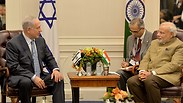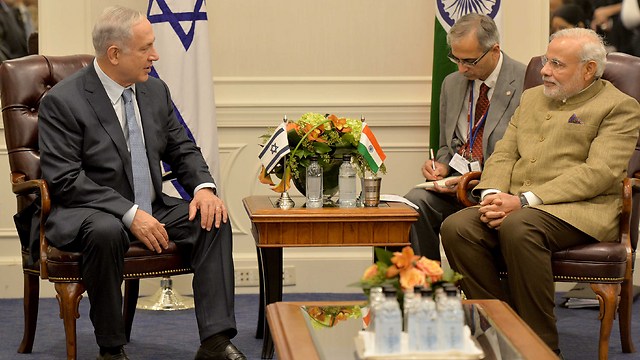
From Delhi to Jerusalem
Analysis: With his insistence on economic growth (and neglect of the issues at the heart of the social protests), is Netanyahu seeking to imitate the success of his Indian counterpart - and admirer of Israel - Narendra Modi?
A man of growth
People change less than one might suppose. Leaving the Finance Ministry in summer 2005, Benjamin Netanyahu set a target for Israel: In just one decade, it would become one of the developed countries with the highest GDP per capita. He also outlined the measures necessary to achieve that goal - growth, growth, growth.
In spring 2009, when Netanyahu became prime minister and handed the Treasury's keys to Yuval Steinitz, he renewed his covenant on growth. You are responsible for ensuring that the economy grows by no less than 5% per year, the new minister was told. Steinitz was quite successful in achieving this goal - at least until 2012, the year of the big downturn.
Netanyahu is trying to forget Yair Lapid's tenure as finance minister. Not because of the continued rise in house prices – in private conversations, Netanyahu did not see such house prices as such a major disaster, and made a point of noting the positive aspects of the rising value of apartments for two thirds of Israel's citizens, especially in the periphery.

Treasury officials have been hearing this from Netanyahu in recent months, and even more intensely since the elections. They got the message that Netanyahu sees growth acceleration as of primary importance and as the ultimate economic test of his upcoming term in office.
The hot button topics of the social protests - the cost of living, regulating banking fees, VAT exemption for basic commodities and retirement age – are at the bottom of Netanyahu's list of economic priorities, along with multi-year defense budgets. The impressive ability of the Treasury, led by Accountant General Michal Abadi- Boiangiu, to maintain a reduction in the ratio between public debt and the GDP in 2014 (in which Israel went to war in Gaza for almost two months), only led Netanyahu to remark that if Israel's economy grew faster, the ratio would drop even faster.
Bibi only has one major economic goal – national growth. By the end of his new term, Israel must reach a GDP of $400 billion – or $45,000 per person. This is the Netanyahu's vision, and it is of equal importance to him as preventing the Iranian nuclear program. The candidate for finance minister in the next government must take this into account, both politically and personally. If the prime minister is not satisfied with the economic growth rate – a little less than 5% per annum – he will not let it go. Bibi will breathe down his neck until he announces that he can take no more and resigns.
India on the move
India is in the midst of an upheaval. I visit every few years as part of the India-Israel Forum – a meeting of members of the worlds of academia, politics, business, culture and technology in both countries. The length of time that elapses between meetings grants a real sense of the changes taking place in this huge country of 1.3 billion people, which won independence at around the same time as Israel.
The last meeting in New Delhi was attended by dozens of individuals from across the country. The Israeli delegation led by the president of Tel Aviv University, Prof. Joseph Klafter, and the chairman of its Executive Committee, Dr. Giora Yaron. In discussions, talks and lectures, we well absorbed the atmosphere of an Indian revolution in the making, and the great hope that accompanies it, shared by hundreds of millions.
It's no secret Indian Prime Minister Narendra Modi admires Israel and Israelis. Those who visited him while he was chief minister of the prosperous state of Gujarat talk of a big picture of the late Ariel Sharon that adorned his office.
Although since becoming prime minister last year, Modi has avoided detailed statements on Israel, it is customary in India (and indeed where is it not?) for the leader's sensibilities to filter down the chain of command. Modi met with Netanyahu on the sidelines of the UN General Assembly in September last year, and in February of this year, Indian Defense Minister Manohar Parrikar received a visit from his Israeli counterpart Moshe Ya'alon. Official and unofficial relations between India and Israel have improved and been given a massive boost.
Among other things, gone are various past accusations, raised but never verified, against the Israeli defense industry – namely, Rafael, the aviation industry and Israel Military Industries – over its receipt of tenders from the Indian army. Every winning tender involves considerable Israeli investment in India itself, a transfer of technology and partnership with a local body.
High-tech companies, which in the past were met with polite evasion, have been received over the past year with open arms, and cooperation agreements have been signed. In 2013, a branch of Indian multinational conglomerate the Tata Group invested millions of dollars in a fund at Ramot, Tel Aviv University’s technology transfer company.
“Tel Aviv University can be an extension to Tata’s R&D programs,” said Ramot chairman Giora Yaron at the time.
And other Indian corporations want to follow suit. Six Israeli biotechnology and medical device companies have begun selling in India, despite the serious barriers to entry.
There really is fantastic potential in India. Civil Israeli exports to India are still negligible, standing at just $1.1 billion per year, not including diamond trading. Modi recently made a lightening visit to various European capitals, proudly presenting Indian economic growth figures that showed a rise that is "even faster than China" - 7.5% to 8% per year.
And I don’t doubt these figures. The changes in India impressed the Israelis who attended the forum, which is apparently growing at a faster rate than what is reflected in the statistics. There has been an evaporation of the old worldview that prevented the citizens of this huge country, with its many cultures, religions and classes, from enjoying political democracy and economic prosperity. Direct foreign investment in India has grown over the past year by approximately 30%, and Moody's this month revised India's sovereign credit rating outlook from "stable" to "positive".
There are also encouraging signs of progress against corruption. All motorcycle transport and motorized rickshaws in Delhi must have a meter installed, displaying the cost of each journey. A less than encouraging sign, however, was the discovery upon my return to Israel that a central Delhi store catering mainly to tourists had charged my credit card three times for my transaction. Although my credit card company erased the two additional charges, the taste of disappointment still remains.











